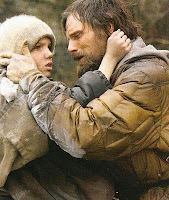The Road

Last fall both Bob and I read the novel The Road by Cormac McCarthy. He's an interesting author, probably best known now for books that have become movies - All the Pretty Horses and No Country for Old Men. I first saw the film for All the Pretty Horses, and then moved into his novels, surprised by the bleakness. Something draws me in and horrifies me and uplifts me all at the same time.
In his book review of The Road in the New York Times, William Kennedy discusses McCarthy's style: "But on the basis of “No Country for Old Men” and “The Road” it does seem that he has put aside the linguistic excesses and the philosophizing for which he has been both venerated and mocked — those
 Faulknerian convolutions, the Melvillean sermonizing — and opted for terse dialogue and spartan narrative, a style he inherited from another of his ancestors, Hemingway, and long ago made his own." The argument could be made that McCarthy is one of our greatest modern writers, yet I would venture to guess that not many folks read a lot of his novels, especially those not made into movies. Is it his style, his subject matter, or his view of humanity that makes him hard to love?
Faulknerian convolutions, the Melvillean sermonizing — and opted for terse dialogue and spartan narrative, a style he inherited from another of his ancestors, Hemingway, and long ago made his own." The argument could be made that McCarthy is one of our greatest modern writers, yet I would venture to guess that not many folks read a lot of his novels, especially those not made into movies. Is it his style, his subject matter, or his view of humanity that makes him hard to love?Watching The Road last night was tough. While the world of the film lacks color, the beauty of the relationship between the Boy and his Papa is vibrant, simultaneously beautiful and horrific. The idea of loving a child so much you're willing to kill him to save him is one I can't shake; it haunted me when I read Morrison's Beloved and it drew up inside me last night as I watched the film. Joe Penhall, who wrote the screenplay, commented about screening the film for McCarthy and his son John: "And of course we talked about John, the treasured son who inspired so much of The Road, born as McCarthy neared his 70s, his greatest prize arriving so late in the day. An encroaching fear of mortality, and of where his own death leaves John, is behind The Road. I had begun my screenplay not long after my own father had died prematurely, identifying with the boy in the book. But by the time we began the edit, I had my own son on the way, and was identifying solely with the father, who, as the world gradually burns up, despairs of ever seeing his son grow old. If his other masterpiece, Blood Meridian, was about "the limits of our inhumanity", McCarthy said, The Road was about "the limits of our humanity"."
I had to put down The Road several times during my reading of it. Some scenes, like the Boy and his Papa startling a group in the woods and then discovering what they were cooking for their evening meal were just too much to take in all at once. Last night I stayed with it from beginning to end, dreading knowing what was to come while compelled forward by the love of the Papa for the Boy and vice versa. I sobbed at the end - for the boy, the father, for myself, for us all.

Today I can't shake the film. Bob has refused to talk about it. He told me the book haunted his dreams for weeks after he finished it and he can't talk out loud about the film. I may have to revisit the novel, although I'll probably approach it in a more round about way, through Blood Meridian or The Crossing or one of his other novels. Either way, I'm hugging my boy close today and watching the sky for signs.
Articles on the book, film, and Cormac McCarthy:
http://www.guardian.co.uk/film/2010/jan/04/the-road-cormac-mccarthy-viggo-mortensen
http://www.nytimes.com/2006/10/08/books/review/Kennedy.t.html?pagewanted=3&_r=2&partner=rssnyt&emc=rss&adxnnlx=1276369211-NxpGKsQn3xaV/gezLgvpkQ
http://dpsinfo.com/theroadrumors/index.html
http://www.nytimes.com/1992/04/19/books/mccarthy-venomous.html?pagewanted=3
Comments